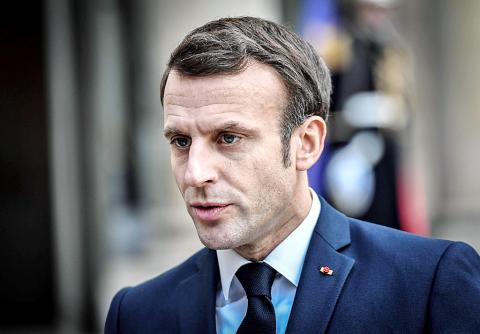France, the EU’s sole nuclear power since Britain’s exit from the bloc, was to unveil how it intends to use its atomic arsenal as a deterrent.
French President Emmanuel Macron, in an address to military officers graduating in Paris yesterday, was expected to recommit to upgrading France’s capacity, at a time when NATO allies, who would ordinarily look to the US in a nuclear standoff, worry about Washington’s retreat from the multilateral stage.
On Monday, Macron said that his speech would address the interests of other European countries.

Photo: AFP
“I will focus on the doctrine [of French deterrence], but also on the procedures and modalities that I wish to propose on this topic to our partners in the coming months,” he said on a visit to Warsaw.
Deterrence theory postulates that countries with nuclear weapons are less likely to attack each other for fear of mutual destruction, meaning the arms serve as guarantors of peace.
France considers nuclear deterrence a keystone of its defense strategy and the ultimate guarantee of its most vital interests.
Macron has already agreed to a costly modernization of France’s atomic arsenal, saying in January 2018 that “deterrence is part of our history, part of our defense strategy, and will remain so.”
An act of parliament provides for about 37 billion euros (US$41 billion) to be spent on the maintenance and modernization of the French nuclear arsenal from 2019 to 2025 — about 12.5 percent of the total defense budget for those seven years.
Macron’s address comes after Russia and the US last year withdrew from the Soviet-era Intermediate Range Nuclear Forces treaty.
Macron in December last year said that the treaty’s end meant that “France, Germany, and other European countries are now threatened by new Russian missiles.”
Washington has also since threatened not to renew the New START treaty with Russia, the last key nuclear deal between the former Cold War foes.
The treaty, which expires this month, obliged both sides to halve their number of strategic nuclear missile launchers and establish a new verification regime.
Corentin Brustlein, research director at the Paris-based French Institute of International Relations, said that Europe has always been a strong focus of France’s nuclear vision.
There had been several French attempts at dialogue with European partners on the topic “that have never succeeded,” Brustlein said.
However, “the balance is shifting, including in countries such as Germany” where public opinion is deeply anti-nuclear and the subject remains largely taboo, but “where we see emerging positions on the level of European strategic ambition that must grow,” he said.
On Monday, a senior member of German Chancellor Angela Merkel’s Christian Democratic Union pleaded for the EU to create its own nuclear deterrence capability.
Germany should “consider cooperation with France regarding nuclear weapons” and “should be prepared to participate in the nuclear deterrent force with its own capabilities and means,” Johann Wadephul said in an interview with the Tagesspiegel daily.

It is usually a serene two-and-a-half-hour ride on Japan’s famously efficient bullet train, but on Saturday, the journey quickly descended into a zombie apocalypse, with passengers screaming in terror. Organizers of the adrenaline-filled trip, less than two weeks before Halloween, touted it as the world’s first haunted house experience on a running Shinkansen. On board one chartered car of the Shinkansen, about 40 thrill-seekers were ready to brave an encounter with the living dead between Tokyo and the western metropolis of Osaka. The eerie experience was inspired by the hit 2016 South Korean action-horror movie Train to Busan, in which a father and

IRANIAN THREATS: Revolutionary Guards chief Hossein Salami said that it would be a ‘mistake’ for Israel to attack Iran and if it did ‘we will strike you again painfully’ Israel yesterday bombed a Syrian coastal city, while the US conducted multiple strikes on targets in Yemen nearly a month into Israel’s war with Hezbollah in Lebanon. Syria, the Houthi rebels in Yemen, Hezbollah and Hamas in Gaza all belong to the so-called “axis of resistance” led by Iran, which on Oct. 1 conducted a missile strike on Israel. Israel has vowed to retaliate for the strike. Iran’s Revolutionary Guards chief Hossein Salami yesterday said in a speech that Tehran would hit Israel “painfully” if it attacks Iranian targets. “If you make a mistake and attack our targets, whether in the region or in

NEW RECRUITS: A video released by Ukrainian officials allegedly shows dozens of North Koreans lining up to collect military fatigues from Russian servicemen Russian aerial strikes wounded more than a dozen and knocked out electricity for tens of thousands of Ukrainians overnight in attacks on residential areas as temperatures dropped toward freezing, Kyiv said yesterday. Ukraine also said it had targeted a crucial Russian explosives factory, about 750km from the border, in an overnight drone attack, while Moscow said it had shot down 110 drones, the largest attempted aerial barrage by Kyiv in more than two weeks. At least 17 people were wounded in an attack on Kryvyi Rig, Ukraine, including a first responder, the Ukrainian State Emergency Service said. “At night, the enemy attacked Kryvyi

The space rock that slammed into Earth 66 million years ago at the end of the Cretaceous Period caused a global calamity that doomed the dinosaurs and many other life forms, but that was far from the largest meteorite to strike our planet. One up to 200 times bigger landed 3.26 billion years ago, triggering worldwide destruction at an even greater scale, but as new research shows, that disaster actually might have been beneficial for the early evolution of life by serving as “a giant fertilizer bomb” for the bacteria and other single-celled organisms called archaea that held dominion at the